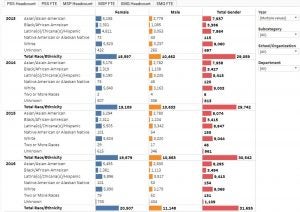Dear Bruin Community:
Protecting our community from sexual misconduct, harassment, intimidation and other forms of harmful behavior is of the utmost importance at UCLA. On August 14, 2020, the University of California issued its revised Sexual Violence and Sexual Harassment (SVSH) Policy (PDF) to comply with 2018 guidance regarding Title IX regulations issued by the U.S. Department of Education (DOE). Despite concerns about the proposed regulations which we detailed in a response from the University of California (PDF), the final regulations (PDF) remain mostly unchanged from those proposed in 2018.
Sexual violence and sexual harassment are violations of UCLA’s values and of the safety and dignity of everyone in our community. The changes to federal regulations do not compromise UCLA’s determination or ability to provide a fair and impartial process that enforces our community standards, protects the well-being of those bringing complaints and respects the rights of the accused.
We would like to emphasize what has not changed and clarify some of the changes now in effect due to the new regulations.
What Has Not Changed:
The same conduct that was prohibited by the UC SVSH Policy prior to August 14, 2020 is still prohibited. UCLA remains committed to protecting our community from sexual violence, harassment, stalking, relationship violence and other forms of Prohibited Conduct (PDF). However, as explained below, a subset of Prohibited Conduct is now covered by the new DOE regulations, which are referred to in the SVSH Policy as “DOE-Covered Conduct.”
What Has Changed:
Definition of Sexual Harassment
Under the DOE regulations, sexual harassment includes unwelcome sexual or other sex-based conduct that a reasonable person would determine is so severe, pervasive, and objectively offensive that it effectively denies the complainant equal access to the university’s programs or activities. The difference in standards between the DOE and UC SVSH Policy definitions is that the DOE requires the conduct to be severe, pervasive and objectively offensive while our SVSH Policy requires the conduct to be severe, pervasive or persistent. The DOE’s definition of sexual harassment imposes a higher standard that may be harder to prove. However, under certain circumstances, sexual harassment may still be reviewed under our SVSH Policy process.
Location of Harassing Conduct
The new DOE regulations cover sexual misconduct that occurs in a university’s program or activity while the complainant is in the United States. The DOE regulations also cover conduct that occurs off campus as long as it involves an educational program or activity. This excludes other types of conduct that occur off campus including conduct in study abroad programs.
However, the protections in the UC SVSH Policy are broader and cover conduct in a UC program or activity (wherever located), including off-campus conduct that creates a hostile environment on campus or in a UC program or activity. Please note that the DOE regulations do not prevent the University from continuing to respond to such conduct and that these protections will remain in place.
Live Hearing and Questioning by Advisors
The DOE regulations require a live hearing to determine whether a student, staff or faculty respondent engaged in DOE-Covered Conduct before disciplining a respondent for such conduct. Additionally, under the new regulations, if the complainant or respondent has questions for the other party, that party’s advisor can ask them at the hearing. If a party does not have an advisor at the hearing, the University will provide a person to read the party’s questions.
We further want to clarify that the new DOE regulations apply only to alleged conduct that occurred on or after August 14, 2020. If any of the conduct is covered by the regulations and the process could result in discipline, the University must address the conduct through a process that is required by the regulations (referred to in the policy as the “DOE Grievance Process”). All other conduct will continue to be addressed by the same processes that existed prior to August 14, 2020, regardless of when the report is filed.
Additional Guidance and Support
We understand the aforementioned changes have created confusion about reporting options and procedures regarding reports of sexual misconduct. We encourage you to visit the University of California’s SVSH FAQ and Title IX Regulations FAQ (PDF) for additional information.
Please know that confidential support services are available to anyone in our campus community who believes they have been affected by sexual harassment or sexual violence. Students can find more information at the Campus Assault Resources and Education (CARE) and Student Legal Services websites. Counseling support for faculty and staff is available through Campus Human Resources. Information on making a report is also available at the Office of Equity, Diversity and Inclusion’s Title IX website.
UCLA remains committed to ensuring that our policies and procedures protect the rights and welfare of all parties involved in Title IX processes. We will work with all parties to make sure the resolution procedures are clear and accessible. For additional support or guidance, or if you would like to report a Title IX concern, please contact the Office of Equity, Diversity and Inclusion’s Title IX Office at 310-206-3417 or titleix@conet.ucla.edu.
Sincerely,
Anna Spain Bradley
Vice Chancellor for Equity, Diversity and Inclusion
Mohammed Cato
Title IX Director






